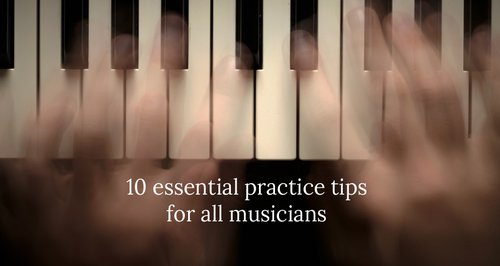On Air Now
Relaxing Evenings with Zeb Soanes 7pm - 10pm
27 December 2018, 16:37

Incorporate these tips into your daily practice routine, and you'll soon see the benefits.
1. Create atmosphere
Get the right set-up for you. Whether you prefer to concentrate in a quiet practice room or somewhere with more stimulation, try be consistent with your choice. This will help you enter the right mindset when you begin to practise.
Make sure you have everything you need close by: water, snacks, pencils, sharpeners, rubbers, highlighters, manuscript paper - it will save you a lot of time. Technology can also be an amazing aid, providing you don't spend too much time faffing with it. Why not download free apps that act as a metronome, a tuner or a timer (all essential tools for practising)?
2. Warm up
Like a physical workout, a warm-up is essential. But don’t just plough through the same warm-up routine every-time and let your mind wander – a warm-up isn't just about getting your muscles moving. Take it as an opportunity to prepare your body and mind for work and take stock of how you're feeling, how you're breathing, the tension your body is holding and why you are doing that particular exercise.
Your warm-up doesn’t always have to be 15 minutes of scales; try different technical studies or sight reading. If you are going to do scales, consider the keys of the pieces you are rehearsing. And as a cool-down, revisit a piece of music you already know well and enjoy.
3. Have a goal
Playing through all your old music isn’t the same as practising. Start with the end in mind: by having a goal for each practice session before you start playing, you will find you progress much more quickly and effectively. Then, break each goal down into smaller, focused objectives. You'll feel a great sense of accomplishment as you complete each goal.
4. Be realistic
We all grow up with our teachers telling us "don’t leave it until the night before". We’ve all been guilty of it at some point, and if we have an intimidating part to practise, it is easy to push it to the back of our mind. However, it is much more effective to practise little and often, and slowly chip away at your nemesis day by day.
It’s about quality, not quantity. If you aim to practise smarter, not longer, you will find yourself with a lot more willpower to draw upon. By setting small and realistic goals, you will find you overcome tricky areas much easier, and you'll be less likely to beat yourself up for not completing absolutely everything you had planned.
5. Identify and overcome the problems
Don’t just play a piece or passage over and over again, and definitely don’t just power through a problem area and ignore it. Identify where you are stumbling out of time or continuously using the wrong fingering, work out why it's going wrong, then decide how you are going to fix it.
Not every problem should be approached in the same way. If it's a rhythmic problem, try practising the rhythm alone on a table or just using one note alongside a metronome so you don’t have to think about the notes as well, starting slowly then gradually increasing the tempo. Once you’ve mastered the rhythm, you will find re-introducing the notes much easier. When you've overcome the problem, don’t go straight back to the beginning of the piece or passage; practise working in and out of the phrase from a few measures before until a few after, to ensure continuity.
6. Being a musician is so much more than just playing the notes
It's also important to understand your instrument, its repertoire, the history of the period and why the music is written a certain way. For example, if you are singing in a foreign language, make sure you translate the libretto so you understand the true meaning behind the words. Spend some time listening to great artists and recordings of the music you are playing and try analyse what makes the artist or particular performance so great.
Visualising yourself playing the music can also be extremely helpful. Whether you visualise playing the part perfectly in the practice room or the concert hall is up to you, but spending some time away from your instrument, hearing the sound you're aiming for, seeing the music in front of you can make a huge difference to your mental and physical performance. If you’re tight for time, or you’re going to be stuck somewhere quiet like a train, take your music with you and read through it in your head.
7. Write on your music
Don’t be afraid to scribble on your scores. Obviously some music does have to be treasured, but photocopy your score and do whatever it takes to make it easier to interpret the music. If you miss something once, make a mental note. But if it is a common occurrence then don’t be afraid to write in the correct fingering, highlight dynamics or remind yourself of a key change.
8. Record yourself
By recording your practice sessions you can listen back and perhaps spot some things you may want to consider doing differently that you miss in the moment of practicing or performing. Even consider filming yourself as well as recording yourself, you may notice tension that you were unaware of.
9. Be in the right frame of mind
We’re all human, and sometimes we're simply just not in the mood to practise – and there's no point in practising and creating new mistakes rather than overcoming them. So unless you’re under a huge amount of time pressure, it’s OK to take a day off or simply keep your fingers moving by spending 10-20 minutes playing something you know well and really enjoy. Ultimately, we all play because we enjoy the feeling and sound of our instrument, and it can be easy to get frustrated with the pressure and forget to have fun.
10. Reward yourself
At the end of each practice session, remind yourself how amazing you are to be playing an instrument and treat yourself afterwards!


Promoted by Bounce